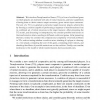21 search results - page 3 / 5 » Game interpretation of Kolmogorov complexity |
107
Voted
ATAL
2007
Springer
15 years 8 months ago
2007
Springer
We develop a model of normative systems in which agents are assumed to have multiple goals of increasing priority, and investigate the computational complexity and game theoretic ...
102
click to vote
MFCS
2010
Springer
15 years 9 days ago
2010
Springer
We introduce Transformation Games (TGs), a form of coalitional game in which players are endowed with sets of initial resources, and have capabilities allowing them to derive certa...
TACAS
2005
Springer
15 years 7 months ago
2005
Springer
Abstract. The automatic synthesis of programs from their specifications has been a dream of many researchers for decades. If we restrict to open finite-state reactive systems, th...
TACAS
2007
Springer
15 years 8 months ago
2007
Springer
For specifying and verifying branching-time requirements, a reactive system is traditionally modeled as a labeled tree, where a path in the tree encodes a possible execution of the...
111
Voted
ATAL
2010
Springer
15 years 3 months ago
2010
Springer
Multi-agent learning is a crucial method to control or find solutions for systems, in which more than one entity needs to be adaptive. In today's interconnected world, such s...


